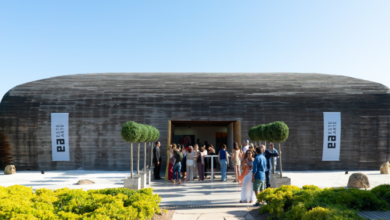After 15 years of leftist governments, Luis Lacalle Pou assumed the presidency on March 1 and promises a new direction in a polarized country

Luis Lacalle Pou will be the president of Uruguay for the next 5 years. / Photo: twitter.com/luislacallepou
LatinAmerican Post | Juliana Suárez
Listen to this article
Leer en español: Uruguay: los retos que tiene su nuevo presidente
The triumph of an opposition party after 15 years of leftist government came after a recent slowdown in the economy and growing polarization in the country that led to the left losing its strength. Thus, Luis Lacalle Pou arrived, a man of 46 – becoming the youngest president of Uruguay – and from a family of politicians of the National Party, who last Sunday celebrated his arrival at the presidency in a traditional parade.
The arrival of Lacalle Pou to the presidency was not only a factual event but also loaded with symbolism that represented his family of political tradition. When Tabaré Vazquez transferred the presidency to him, the right-wing politician arrived in a luxurious car that belonged to his great grandfather years ago, the leader of the National Party, Luis Alberto de Herrera. This would represent the traditional policies that his family comes from and those that will probably arrive during his five years in the presidency.
Also read: Who is Luis Lacalle Pou, the elected president of Uruguay?
In his speech, Luis Lacalle Pou thanked his voters and outgoing President Tabaré Vazquez for helping to consolidate democracy in the country. “ Tomorrow starts a government that will not rest, tomorrow starts a government to carry out the will of all Uruguayans. And finally, if everything goes well, it will be thanks to the team and if at some point things do not go as Uruguayans need and want, do not look to the side, the responsibility will be exclusively of the president of the republic, ”he concluded.
The challenges of Lacalle Pou
In order to strengthen the opponents of the left, the different parties that were part of the elections joined in the second round to support Lacalle Pou and ensure that, although their party would not be in the presidency, it would be one more akin to their ideologies. With that premise, a coalition was formed that included five parties, including the Colorado Party, the Cabildo Abierto (both of the two candidates that were left out of the second round) and the National Party.
One of the great challenges of Luis Lacalle will be to give voice and representation to this heterogeneous coalition. That, in the middle of a country that still has a strong left, because although it has not won and is beginning to weaken, the Frente Amplio candidate managed to have only one point less than the winner. This being the case, the president must demonstrate that he can achieve a right turn by respecting a population that has been moving towards the left for years.
"Be calm. In this modern world of collective leadership we have had a process of combining five political parties, but above all combining human beings of goodwill that will do the best of them in these next five years for the good of the country" said the president in his speech.
Hoy asumimos la responsabilidad de gobernar el país por los próximos 5 años. pic.twitter.com/GRgpmlU1G7
— Luis Lacalle Pou (@LuisLacallePou) March 2, 2020
But the union of a country with different positions is not his only challenge, as Uruguay has been facing an economic slowdown that has many of its citizens worried, as this has been one of the most stable countries in the region for many years.
Although Frente Amplio during its fifteen years in power managed to bring the Uruguayan economy to important points, reaching GDP growth of 67% at constant prices between 2005 and 2018, according to ECLAC, in recent years annual growth only reached reach 1.3%. Strengthening growth has been and will continue to be a great challenge in a country as small as Uruguay. To do this, one of the main points of Lacalle's government will be the strengthening of small businesses, by "reviving production and employment. "
Finally, Uruguay in recent years has tried to open up to the world to be recognized internationally for its products, its policies and its democracy. In the next five years, Luis Lacalle Pou will have the challenge of continuing to do what his predecessors had been doing globally. Therefore, one of his points of government is international insertion, where he will try to open markets and make alliances, which would not only put Uruguay on the world spectrum in diplomatic terms but also seeks to strengthen its economy.
Read also Maduro went after his critics again
However, at this point, the new right-wing government will have to make decisions regarding some alliances and relations in the Latin American region that do not go hand in hand with its policies and ideologies, such as the left-wing governments of countries like Venezuela or Nicaragua. Although the Uruguayan left did not have the negative connotation that these other governments in the region have, Lacalle Pou will rearm the alliances focusing on other countries that are aligned with its policies.
In his government plan, he said that one of his purposes in foreign policy will be to realign it with "the principles of International Law, the peaceful resolution of disputes, democracy, the defense of human rights and respect for the rule of law." At the inauguration ceremony presidents like Iván Duque, from Colombia, Mario Abdo Benitez, from Paraguay, and Sebastián Piñera, from Chile were invited. On the other hand, the representatives of the governments of Venezuela, Nicaragua and Cuba were not.





